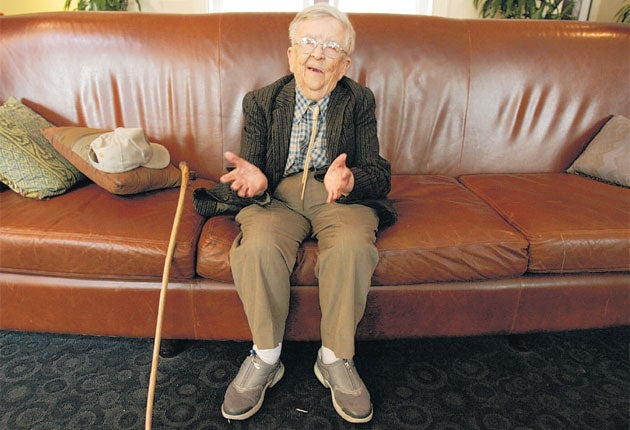Munchkinland's leading citizen dies at 94
Meinhardt Raabe made movie history playing the coroner in 'The Wizard of Oz' and declaring the wicked witch 'most sincerely dead'

Your support helps us to tell the story
From reproductive rights to climate change to Big Tech, The Independent is on the ground when the story is developing. Whether it's investigating the financials of Elon Musk's pro-Trump PAC or producing our latest documentary, 'The A Word', which shines a light on the American women fighting for reproductive rights, we know how important it is to parse out the facts from the messaging.
At such a critical moment in US history, we need reporters on the ground. Your donation allows us to keep sending journalists to speak to both sides of the story.
The Independent is trusted by Americans across the entire political spectrum. And unlike many other quality news outlets, we choose not to lock Americans out of our reporting and analysis with paywalls. We believe quality journalism should be available to everyone, paid for by those who can afford it.
Your support makes all the difference.When Judy Garland skipped down the Yellow Brick Road as Dorothy in the 1939 film The Wizard of Oz she was followed by a crowd of dancing "little people" who had no idea how that movie – overshadowed by Gone with the Wind on its first release – was about to change their lives.
On Friday one of the few surviving Munchkins, Meinhardt Raabe, died at the age of 94. Although he appeared on screen for just 13 seconds and was uncredited in the film, Raabe became one of the most instantly recognisable characters in Hollywood history. He played the Coroner who, with his oversized broad hat, beard and scroll, pronounced the Wicked Witch "really most sincerely dead".
He was one of the few midgets, as they were then known, to have a speaking part. When The Independent on Sunday spoke to him last year to mark the 70th anniversary of the film he said that he was chosen because of his background in public speaking. "They auditioned several of the Munchkins for the part of the Coroner, but most of them mumbled," he said from the Florida care home where he lived. "Because I had a background in public speaking I could enunciate clearly, so they picked me. I was the only one they could understand.
"MGM was calling all over for little people. They had wanted to get 200, but could only find 124. I was only 23 at the time. This is the 70th anniversary of the film and they are still showing it in many movie theatres. I enjoyed having a part and met Judy Garland, although I mainly worked with her stand-in. She was a very personable and considerate individual."
Raabe was frail and somewhat deaf but he, like all the Munchkins, spoke warmly of the film. MGM had cast its net across America and the little people travelled from every corner of the US – Raabe was from Wisconsin – to the Hollywood film studios.
Many had never met another little person before and they found a home in the movies rather than at travelling fun fairs, met their partners and embarked on a life-long association with the film. Now into their late 80s and 90s, they continue to travel the world to attend festivals in honour of one of the world's most popular films.
Raabe was about 3ft 6in (1.07 meters) tall when the movie was made – making him one of the taller Munchkins - and eventually grew to about 4ft 6in (1.37 meters). He, however, saw his first little people at the Midget Village during a visit to the World's Fair at Chicago in 1933, and became a barker for the fair the next year.
That job allowed him to fund his way through the University of Wisconsin. He graduated with a degree in accounting in 1937. He eventually took a job with the food company Oscar Mayer as a salesman. During the Second World War, he became an accomplished pilot with the Civil Air Patrol.
In the 1980s, Raabe became a regular at the Oz festivals, and, in many cases, it was Raabe's presence that helped them become so successful. In 2007, he was one of then seven surviving Munchkins to see a star inaugurated for them on the Hollywood Walk of Fame. His death leaves just four survivors.
"It's an ego trip," he said of the festivals and fan mail. "This is our reward, the nostalgia. There is nothing in the picture that dates it. There are no old vintage cars or old vintage streetcars. It's a fantasy picture that will be fantasy for generations to come."
Join our commenting forum
Join thought-provoking conversations, follow other Independent readers and see their replies
Comments